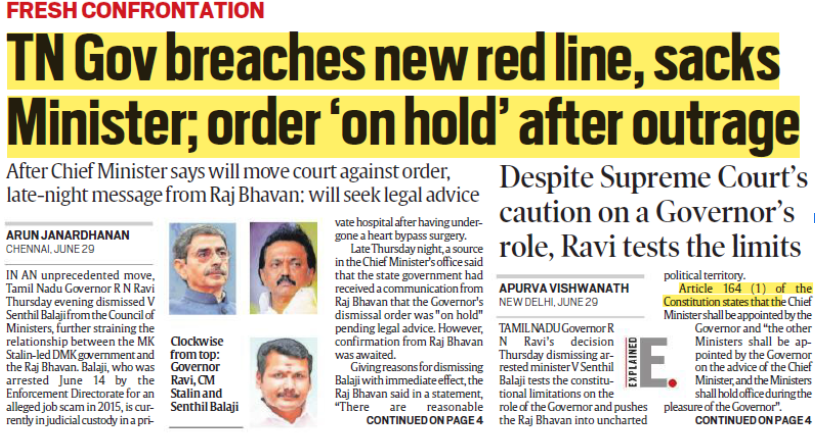Important for
Prelims: Indian polity
Mains: General Studies II; Centre State Relations;

- Tamil Nadu Governor R N Ravi’s decision Thursday dismissing arrested minister V Senthil Balaji tests the constitutional limitations on the role of the Governor & doctrine of pleasure.
- Article 164 (1) of the Constitution states that the Chief Minister shall be appointed by the Governor and “the other Ministers shall be appointed by the Governor on the advice of the Chief Minister, and the Ministers shall hold office during the pleasure of the Governor”.
- In Shamsher Singh v State of Punjab, a 1974 ruling by a seven-judge Constitution bench of the Supreme Court said that a Governor must exercise “formal constitutional powers only upon, and in accordance with the aid and advice of their ministers, save in a few well-known exceptional situations”.
- These exceptions relate to dismissal of a government that has lost its majority, the decision to invite a party to form the government – both circumstances where the aid and advice of the Council of Ministers is unavailable or unreliable.
- Last year, Kerala Governor Arif Mohammed Khan had written to Chief Minister Pinarayi Vijayan, asking him to take “constitutionally appropriate action” against state Finance Minister K N Balagopal and cautioned against a possible “withdrawal of pleasure”.
Appointment of governors
- The governor is appointed by the president under his hand and seal
- The SC in 1979 said that the office of governor is not an employment under the central government. It is an independent constitutional office and is not under the control of or subordinate to the central government
Qualification
- He should be a citizen of India
- He should have completed the age of 35 years
Conventions that have developed while appointing a governor
- He should be not from a state where he is appointed
- While appointing the governor, the president is required to consult the CM of the state concerned
Conditions of the governor’s office
- He should not be member of either house of Parliament or a house of the state legislature. If any such person is elected as governor, he is deemed to have vacated his seat in that house on the date which he enters upon his office
- He should not hold an office of profit
- He is entitled, without payment of rent, to the use of his official residence
- He is entitled to such emoluments, allowances and privileges as may be determined by Parliament
- His emoluments and allowances cannot be diminished during his term of office
- If he is appointed as the governor of two or more states, his salary and allowances payable to him are shared by the states in such proportion as determined by the president
Immunity
- He enjoys personal immunity from legal liability for his official acts
- During his term of office, he is immune from any criminal proceedings, even in respect of his personal acts. He cannot be arrested or imprisoned
- However, after giving two months’ notice civil proceedings can be instituted against him during his term of office in respect of his personal acts
- The oath of office to the governor is administered by the Chief Justice of the concerned High Court
Term of governor’s office
- He holds the office for a term of five years
- However, his term is subjected to the pleasure of the President
- The constitution has not laid down any grounds for the removal of the governor by president
Practice Questions for Prelims
The Governor exercises his constitutional or situational discretion when
1. Exercising his functions as the administrator of the adjoining union territory.
2. Recommending the imposition of President’s Rule in the state.
3. Approving any ordinary bill that falls under the Concurrent List in the Seventh Schedule
4. Seeking information from the Chief Minister with regard to the legislative matters of the state.
Select the correct answer using the codes given below:
a) 2 and 3 only
b) 1 and 4 only
c) 1, 2 and 4 only
d) 2, 3 and 4 only
Ans. c)
Mains Practice Question
Discuss the essential conditions for exercise of the legislative powers by the Governor. Discuss the legality of re-promulgation of ordinances by the Governor without placing them before the Legislature. (2022)




Leave a Reply
You must be logged in to post a comment.